Scroll to get to know the MJS Class of 2025.
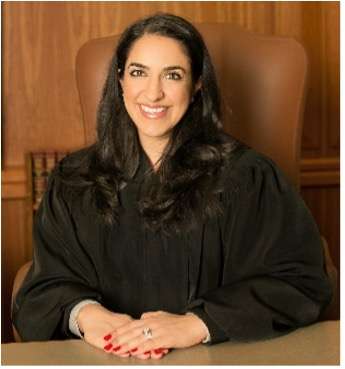
Susan Blanco
Chief Judge, Eighth Judicial District Court, Colorado
Fort Collins, Colorado
Susan Blanco is the Chief Judge of the 8th Judicial District of Colorado and is the first female chief judge for the district. She has presided over criminal, civil, probate, domestic relations, and terminations and adoptions. Prior to the bench, she served as a Deputy District Attorney followed by over a decade in private practice focusing on criminal defense, juvenile delinquency, dependency and neglect, and municipal prosecution. Chief Judge Blanco graduated with a Bachelor of Science from Colorado State University in 2000 and her Juris Doctorate from the University of Colorado School of Law in 2003. She is invested in the intersection of mental health and criminal justice including her involvement in developing the first Competency Court in Colorado and presiding over Wellness Court, a specialty court serving those with severe and persistent mental health diagnosis. Chief Judge Blanco thrives on collaborative projects between the community and the Judicial Branch including the development of the award winning Latinx Task Force focused on improving access to justice for minority populations. She helped develop and launch the DEI initiative “Lawyer’s Teaching for Change” which allows attorneys to teach about the law in grade school classrooms. Chief Judge Blanco was a founding board member for Colorado Diverse Attorney Community Circle (CODACC) which builds community for diverse attorneys in Colorado. She also serves on the Colorado Bar Association’s Leadership Training Program (COBALT) which cultivates twenty future leaders in the law each year. Currently Chief Judge Blanco also serves on the Colorado Judicial Branch’s Chief Judge’s Council, is a commissioner on the Colorado Access to Justice Commission, serves on the Colorado Bar Association’s Criminal Law Executive Council as well as Executive Council, and is a board member for the Colorado Women’s Bar Association. She is chair of the Colorado Judicial Branch’s Pathways to Access Standing Committee working on virtual proceedings, language access, and plain language forms and she also is the co-chair of the Colorado Judicial Branch’s IT Standing Committee. Chief Judge Blanco is the recipient of the Colorado Women’s Bar Association’s Judicial Excellence Award, the City of Fort Collins’ Human Relations Awards, the Colorado Hispanic Bar Association’s Community Service Award, the Character Fort Collins Award for Benevolence, and Colorado State University’s Public Service Award.
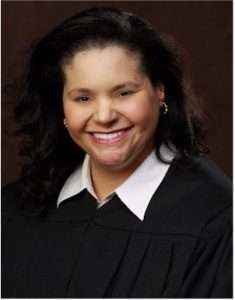 Ada Brown
Ada Brown
Judge, U.S. District Court, Northern District of Texas
Dallas, Texas
Judge Ada Brown is a United States District Court Judge for the Northern District of Texas. She is the first African American woman to hold the position of judge in the 140-year history of the Northern District. In addition, Judge Brown, who is also of Native American heritage, is the only woman judge in the 230-plus year history of the Choctaw nation. She is a former Justice of the Texas Fifth Court of Appeals in Dallas and a former trial court judge in Dallas County courts. She began her career as a criminal prosecutor, prosecuting over 100 jury trials to verdict, also has experience as a civil litigator, specializing in complex commercial litigation and patent infringement cases. Judge Brown is a member of Mensa and is trilingual.
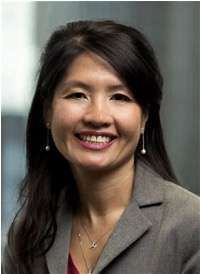 Hope Cannon
Hope Cannon
Magistrate Judge, U.S. District Court, Northern District of Florida
Pensacola, Florida
Judge Hope T. Cannon was born in Saigon, Vietnam. She immigrated to the United States with her mom and 5 siblings when she was 3 years old. Although Judge Cannon spent most of her childhood in Shreveport, Louisiana, she spent two years of high school in Maryland and graduated from Dulaney Valley High School in 1993, at the age of 17. She attended the University of South Alabama in Mobile, Alabama, and graduated with a Bachelor of Science degree in Accounting, Cum Laude, after only three years. Judge Cannon then attended the University of Alabama, School of Law, where she received a full scholarship, and graduated in 1999, Magna Cum Laude. After graduating from law school, Judge Cannon stayed in Mobile for one year, where she worked as an associate in the banking group for Miller, Hamilton, Snider & Odom. Upon deciding she wanted to pursue a career in litigation, Judge Cannon joined the Southeast Regional firm Bradley Arant Boult Cummings, LLP, where she became a partner after six years, and practiced for 19 years. During her time at Bradley Arant, Judge Cannon was licensed in Alabama, Texas, and Florida; handled complex commercial and products cases across the country both at the trial and appellate level; and served on the firm’s Associates Committee. While in private practice, Judge Cannon was recognized as a Super Lawyer, a Minority Powerbroker, a Best Lawyers, and received an AV Preeminent Peer Reviewed Martindale Hubbell rating. She was also a member of the American Bar Associations YLD, President of the Alabama Asian Bar Association, and an avid speaker and writer for the Defense Research Institute. She is currently an American Bar Fellow. Judge Cannon was selected a United States Magistrate Judge for the Northern District of Florida in 2019. Judge Cannon has been married for 18 years and has 5 children.
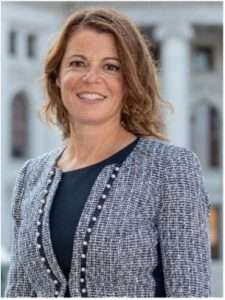 Rebecca Dallet
Rebecca Dallet
Justice, Wisconsin Supreme Court
Madison, Wisconsin
Justice Rebecca Frank Dallet was elected to the Wisconsin Supreme Court on April 3, 2018. Before joining the Supreme Court, she served as a judge of the Milwaukee County Circuit Court, elected in 2008 and re-elected in 2014. She is a former associate dean of the Wisconsin Judicial College and an adjunct professor at Marquette University Law School. Prior to her elected judicial service, Justice Dallet served as the first female presiding court commissioner for Milwaukee County and as a Milwaukee County Assistant District Attorney and a Special Assistant United States Attorney for the Eastern District of Wisconsin. Immediately after graduating from law school, she clerked for Magistrate Judge Aaron Goodstein of the U.S. District Court for the Eastern District of Wisconsin. Justice Dallet received her B.A. summa cum laude with honors from The Ohio State University in 1991 and her J.D. summa cum laude from Case Western Reserve University School of Law in 1994, where she was an editor of law review. Justice Dallet is passionate about the areas of equal access to justice and empowering women as leaders. She chairs a statewide committee on race, equity, inclusion and access and is the Supreme Court liaison to the Access to Justice Commission. Justice Dallet was named a Wisconsin Business Journal Woman of Influence, a Woman in the Law Honoree and a Whitehouse Leadership Project Women Rule! Honoree. She was elected a member of the American Law Institute. Justice Dallet and her husband, Brad, an attorney, have three adult children.
 Josephine Kerr Davis
Josephine Kerr Davis
Judge, North Carolina Superior Court
Durham, North Carolina
Judge Josephine Kerr Davis has over 20 years of civil and criminal law experience. As a defense attorney, she had the privilege of defending the rights of individuals charged with felonies and misdemeanors. As a former prosecutor, Judge Davis worked to safeguard the rights of the accused while ensuring that North Carolina is a safe place to work and live. In addition, as a former prosecutor Judge Davis dismissed 70,000 misdemeanor and traffic related offenses that prohibited individuals from seeking employment and receiving their driver’s license. As a civil attorney, Judge Davis assisted attorneys who represented African American and female farmers that faced discrimination by the Department of Agriculture. She also worked as an Assistant Attorney General representing the State when there were violations of labor and environmental laws. In November of 2018, Judge Davis was elected by the voters of Durham County to serve a term of eight years as a Superior Court Judge. She hears both civil and criminal cases throughout the State of North Carolina. She is the second African-American woman to hold this position in Durham County and is one of the youngest women to be elected as a Superior Court Judge in the State. Judge Davis is a graduate of North Carolina Agricultural and Technical State University and North Carolina Central University School of Law. Judge Davis is a former adjunct professor at North Carolina Central University School of Law, Durham Technical Community College and Concord School of Law. Judge Davis is a member and holds leadership roles in Alpha Kappa Alpha Sorority Inc., Jack and Jill of America Inc., and the Junior League of Durham and Orange Counties. She serves on the board for the Carolina Theater, the Urban Ministries of Durham and the Durham Expunction and Restoration Program. Judge Davis is the mother of Fredrick III, Lincoln James, and Ellington Grace Davis, she is married to Fredrick Davis II, Director of Building Services with Durham Public Schools.
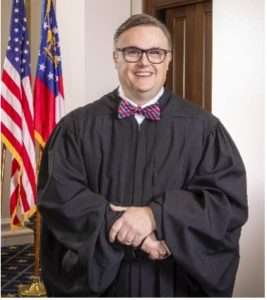 Stephen Dillard
Stephen Dillard
Presiding Judge, Court of Appeals of Georgia
Atlanta, Georgia
Presiding Judge Stephen Louis A. Dillard was appointed as the 73rd judge of the Court of Appeals of the State of Georgia on November 1, 2010, by Governor Sonny Perdue. Prior to his appointment, Judge Dillard was in private practice with James, Bates, Pope & Spivey in Macon, Georgia, serving as chairman of the firm’s appellate practice group; served as law clerk to Judge Daniel A. Manion of the U.S. Court of Appeals for the Seventh Circuit; and worked as an associate for Stone & Baxter (also located in Macon). In 2012 and 2018, Judge Dillard was elected by his fellow Georgians to serve full six-year terms on the Court of Appeals. On July 1, 2017, Judge Dillard was sworn in as the 30th Chief Judge of the Court of Appeals of the State of Georgia for a two-year term, which ended on June 30, 2019. He currently serves as the presiding judge of the Court’s Fourth Division. Judge Dillard is an active alumnus of Samford University (B.A. 1992). He is President Emeritus of the Samford University Alumni Association, and is currently serving his second term as a member of the university’s Board of Overseers. Judge Dillard also graduated with honors from the Mississippi College School of Law. Most importantly, he has been married to his college sweetheart, the former Krista McDaniel, for 29 years. They have three children and are parishioners at Saint Joseph Catholic Church in Macon, Georgia.
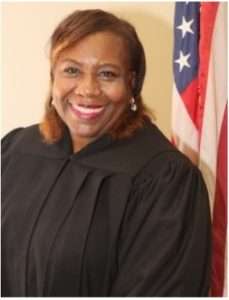 Cenceria Edwards
Cenceria Edwards
Justice, New York Supreme Court
Brooklyn, New York
Honorable Cenceria P. Edwards, CPA is an elected Justice of the New York State Supreme Court, Second Judicial District, presiding in Brooklyn (Kings County) New York, November 8, 2022. Previously, she served as Acting Justice of the New York State Supreme Court, Civil Term, Kings County. She was elected judge of the New York City Civil Court, Kings County, in November 2014 and served her first two years in Criminal Court, Kings County. Justice Edwards has the distinct privilege of holding two accomplished professional licenses in New York State; in addition to her law license, she is a Certified Public Accountant. Justice Edwards is a distinguished Lexis Practical Guidance Author in pretrial civil procedure topics-motion practice. She is the author of “A View from the New York City Civil Court Bench: Vacating Default Judgments – The Self-Represented Litigant”; author of the article, “New York State Procedural Processes to Vacate A Default – The Self-Represented Litigant” and co-author of the article, “Consumer Credit Fairness Act- S153(2021), Impact on the New York State Judiciary”. She also authored “The Judicial Council of the National Bar Association 50th Anniversary Commemorative Journal”. Justice Edwards lectures at the New York State Judicial Institute on Default Judgments and serves on international and national judicial panels. Justice Edwards is President – Elect of the Brooklyn Women’s Bar Association, 2023-2024. In 2022, she received a presidential appointment to the New York State Bar Association’s Access to Justice Committee. She is a past Chair of The Judicial Council of the National Bar Association, the largest organization of African American judges and attorneys worldwide (2020-2021). As Chair, Justice Edwards organized the “JC Judiciary Task Force Committee” to foster and encourage diversity within the judiciary and the “JC Harper Hubbard Leadership Institute” to advance judicial awareness and civic engagement amongst judges, lawyers, and community. She is also a Fellow of the American Bar Foundation. Prior to her judicial career, she managed the Law Firm of Cenceria Edwards, PLLC, which focused on complex litigation and transactional matters for real property. As a trial attorney, she argued cases before the New York State Supreme Civil and Appellate Courts. Justice Edwards is well versed in business and transactional matters for fortune 500 companies. In her career as a corporate tax lawyer, she advised businesses regarding the structure of acquisitions, mergers, and dispositions of its assets for compliance with federal, state, and local tax laws. Upon her graduation from college, she served as an auditor at a premier international accounting firm. Justice Cenceria P. Edwards holds a Juris Doctor from New York Law School and a Bachelor of Business Administration in Accounting from Bernard M. Baruch College, City University of New York.
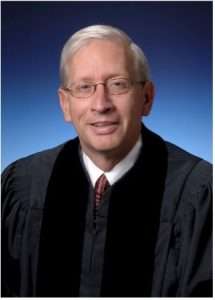 Patrick Fischer
Patrick Fischer
Justice, Ohio Supreme Court
Columbus, Ohio
In November 2022, Justice Patrick F. Fischer was reelected to a second term on the Supreme Court of Ohio. Justice Fischer began his first six-year term on the Supreme Court of Ohio on Jan. 1, 2017, following his election in November 2016. Previously, he was elected to serve as a judge on the Ohio First District Court of Appeals in 2010 and was re-elected in 2012. Justice Fischer has dedicated himself to the practice of law for nearly 40 years. An honors graduate of Harvard Law School and Harvard College, he tried cases as a practicing lawyer throughout the country, and was named to Best Lawyers in America, one of the Top 50 Lawyers in Cincinnati, and one of the Top 100 Lawyers in Ohio. He was routinely named to Ohio Super Lawyers. A respected member of the legal community, then-Judge Fischer served as president of the Ohio State Bar Association from 2012 to 2013. He previously served on the Ohio State Bar Association’s Board of Governors, chaired its budget and headquarters committee, and served on numerous other Ohio State Bar Association committees and task forces, and in its House of Delegates. Justice Fischer also has completed two terms on the board of the Ohio Lawyers Assistance Program. He also was elected by his peers as president of the Cincinnati Bar Association for 2006 through 2007 and served on numerous committees. Justice Fischer has an abiding interest in ethics and professionalism. As an attorney, he served two terms on the Ohio Supreme Court’s Commission on Professionalism, including serving as vice chair. He also chaired the Cincinnati Bar Association’s Ethics and Professional Responsibility, as well as its Professionalism, committees. Having represented plaintiffs and defendants while an attorney, Justice Fischer knows the importance of being able to see and listen to both sides of an issue. Knowing and understanding the law as he does, Justice Fischer is keenly aware of how important it is that the law be applied properly to the facts in each case. The late chief justice of the Supreme Court of Ohio, Thomas J. Moyer, named him to co-chair a task force to make the Ohio judicial system more efficient and just. Justice Fischer served on the Ohio Constitutional Modernization Commission and was vice chair of its committee on the judicial branch. Justice Fischer began his legal career with a clerkship for U.S. District Court Judge William Bertelsman, and in 1987, he began working for the law firm of Keating Muething & Klekamp. Just four years later, he became a partner in the trial department. Although on inactive status, he also is a licensed attorney in Texas. In his free time, Justice Fischer has been a dedicated public servant. He served on numerous local boards, such as the Hamilton County Mental Health & Recovery Services Board, Visions Community Services Board, St. Ursula Villa, and the Pleasant Ridge Community Council. He was a founding member of the Cincinnati Children’s Museum and served on its board, and as its president. Justice Fischer and his wife, Jane, live in Cincinnati. He has one married daughter who is a practicing attorney in Ohio, and two grandsons. A graduate of St. Xavier High School, Justice Fischer also is an active, longtime member of St. Xavier Catholic Church in downtown Cincinnati, serving as both a lector and Eucharistic minister.
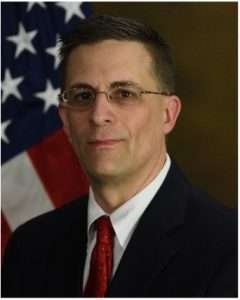 Michael Frank
Michael Frank
Magistrate Judge, U.S. District Court, Northern District of Florida
Pensacola, Florida
Judge Michael Frank is the chief magistrate judge of the United States District Court for the Northern District of Florida. Prior to his judicial appointment, Judge Frank served in the U.S. Department of Justice as an Associate Deputy Attorney General and counsel to the Deputy Attorney General. He was the Justice Department’s national coordinator to combat human trafficking and child exploitation crimes. Judge Frank also previously served as an Assistant United States Attorney in the Eastern District of Virginia. He was assigned to the national security section and the major crimes section. Prior to that, he was a federal prosecutor in the Criminal Section of the Justice Department’s Civil Rights Division. He prosecuted hate crimes, corruption, and human trafficking cases. Judge Frank also served as counsel in DOJ’s Office of Legal Policy. Prior to joining the Justice Department, Judge Frank was a judge advocate in the U.S. Army JAG Corps. While deployed to Iraq, Judge Frank prosecuted terrorists who had attacked Coalition forces. Judge Frank served as a law clerk to the Hon. Daniel A. Manion of the U.S. Court of Appeals for the Seventh Circuit. In the United States and other countries, Judge Frank has provided training on human trafficking to judges, investigators, prosecutors, and victim-witness specialists. He also has served as an adjunct professor at George Washington University’s Elliott School of International Affairs. He is the author of various articles and publications addressing human trafficking, labor and employment law, and the law of evidence.
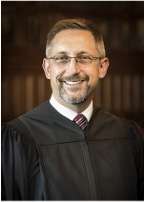 Christopher Goff
Christopher Goff
Associate Justice, Indiana Supreme Court
Indianapolis, Indiana
Christopher M. Goff was appointed to the Indiana Supreme Court by Governor Eric J. Holcomb and took the oath of office as Indiana’s 110th justice on July 24, 2017. He was retained by voters in 2020, in a non-partisan retention vote, receiving over 1.7 million votes (77% of all votes cast in the statewide general election).Justice Goff was born in Wabash, Indiana in 1972. After graduating from high school there, he attended Ball State University, graduating summa cum laude in 1994. He went on to earn his law degree at the Indiana University Maurer School of Law in 1996. He is also a graduate of the Indiana Judicial College and the Indiana Graduate Program for Judges. After law school, Justice Goff developed a successful private practice while giving back to his community. His practice spanned a wide range of areas from criminal defense and domestic relations to personal injury and small business issues, and he was named partner at a Huntington law firm after just 18 months. He served as Huntington County Public Defender for two years. His work led to the establishment of the Huntington County Court Appointed Special Advocate (CASA) program. Justice Goff was named Huntington County Pro Bono Attorney of the Year in 2001 and again in 2002. He also served as President of the Huntington County Police Merit Board and Vice President of the Huntington County Bar Association. Justice Goff then left private practice to serve as Wabash County Superior Court judge for twelve years. During this time, he established the Wabash County Drug Court, Wabash County Family Recovery Court, and Wabash County Reentry Court. Justice Goff served on the Board of Directors of the Indiana Judicial Conference, representing Wabash, Huntington, Wells, and Adams Counties. He also chaired the Protection Order Committee of the Indiana Judicial Conference, which provides guidance to judges, lawyers, and individuals around the state. All told during his time on the trial bench, Justice Goff disposed of over thirty thousand cases and had only one decision overturned on appeal. Since joining the Indiana Supreme Court, Justice Goff has continued serving his fellow Hoosiers. He led a successful statewide initiative to expand Family Recovery Courts in Indiana, nearly tripling the number of programs in just two years. In May 2020, he was appointed to serve as Chair of the Indiana Justice Reinvestment Advisory Council (JRAC). He also serves or has served on the Indiana Task Force on Public Defense, as the Indiana Supreme Court Liaison to the Problem-Solving Court Committee of the Indiana Judicial Conference, and as Chair of the Allen County Judicial Nominating Commission. He is also an adjunct professor of law at the Indiana University McKinney School of Law where he teaches on problem-solving courts. Institutions around the state have recognized Justice Goff’s efforts. In 2018, the Bowen Center presented him with its Centennial Award for working to establish a culture of mental health in Northeast Indiana. In 2020 Ball State University recognized him as one of its Top 50 Graduates of Distinction. Indiana University presented him with its Bicentennial Medal in recognition of his distinguished service. Indiana Wesleyan University awarded him an Honorary Doctorate in recognition of his work to address the behavioral health needs of Hoosiers. Also in 2020, he received an award from the Indiana Sheriff’s Association for his leadership and dedication during the COVID-19 emergency. Justice Goff’s efforts around behavioral health also led to his 2020 appointment to serve on the National Judicial Task Force to Examine State Courts’ Response to Mental Illness. In 2022, Justice Goff was selected, along with Judge Steve Leifman, Associate Administrative Judge, Miami-Dade County, Florida, to serve as national co-chair of the Task Force’s implementation efforts. Justice Goff currently serves as the Secretary of the Appellate Judges Conference of the American Bar Association and served as Chair of the Appellate Judges Education Institute’s 2022 Summit in Scottsdale, Arizona. Justice Goff is also currently writing a one-volume treatise on Indiana Criminal Law and Procedure which is expected to be published by LexisNexis in 2023. Justice Goff and his wife, Raquel, have been married since 1993. They have four children and three grandchildren. In his spare time, Justice Goff enjoys laughing with his family and friends. He has also completed six ultra-marathons.
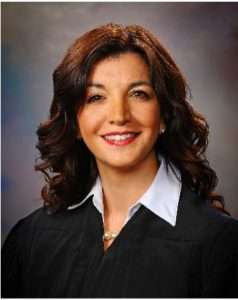 Shiva Hodges
Shiva Hodges
Magistrate Judge, U.S. District Court, District of South Carolina
Columbus, South Carolina
Judge Shiva V. Hodges was appointed to the bench of the United States District Court for the District of South Carolina as a Magistrate Judge in 2010, where she has presided over bench and jury trials while managing employment discrimination and other civil cases, social security appeals, habeas corpus petitions, and prisoner civil rights actions. Judge Hodges’s criminal duties include initial appearances, arraignments, detention/bond hearings, criminal complaints, search warrants, and grand jury matters. She routinely handles mediations at the request of District Judges and federal practitioners. Before her appointment, Judge Hodges served as a career law clerk for six years to then-Chief District Judge Joseph F. Anderson, Jr., and was a litigator for Parker Poe Adams & Bernstein, LLP, handling employment disputes, general civil disputes, and bankruptcy matters in South Carolina and North Carolina. She has authored thousands of opinions and orders since 2010 in federal civil cases and is currently working on a book on Social Security law and practice. She obtained a Bachelor of Science in Biology from the University of South Carolina’s Honors College, a Juris Doctor from the U.S.C. School of Law, and a Master in International Business Studies (Italian track) from the Darla Moore School of Business. Judge Hodges taught Advanced Legal Writing at the USC School of Law from 2013–2016 and is active in legal education and mentoring programs for lawyers and students. She is a frequent speaker on a variety of topics, including employment law issues, e-discovery, ethics and social media, implicit bias, and evidentiary pitfalls. Judge Hodges enjoys teaching regularly at the Department of Justice’s National Advocacy Center. She is the Vice President of the Federal Magistrate Judges Association, Chair of its History and Archives Committee and Finance Committees, has served on its Diversity, International, Civics Education, and Convention Committees, and is the cochair for the April 2023 Roadways to the Bench program. She is also an active member of the Judges Advisory Council of the Lawyers Without Borders international organization, a member of the Leadership South Carolina Board, and a member of the Riley Institute Diversity Leaders Initiative Class of 2023. Judge Hodges received the Matthew J. Perry Civility Award from the Richland County Bar Association in 2020. Judge Hodges is a naturalized citizen, born in Iran, conversant in Farsi (Persian), Italian, and some French. She is married to employment attorney Hayne Hodges. They have four boys and spend most weekends outdoors, at lacrosse tournaments and other sporting events. She enjoys cooking, reading, and traveling. She and her family are members of Trinity Episcopal Cathedral in Columbia, South Carolina.
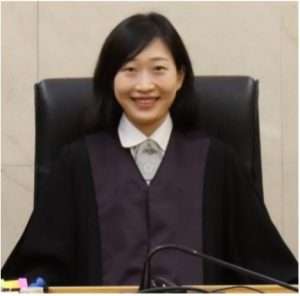 Seo Yoon Lee
Seo Yoon Lee
Judge, Seoul Southern District Court, South Korea
Seoul, South Korea
Judge Seo Yoon LEE was appointed to the District Court system of South Korea in 2012. Judge LEE has adjudicated a wide range of cases, including civil, criminal, administrative, bankruptcy, and family law. In 2019-2020, she taught at the Judicial Research and Training Institute in Ilsan, South Korea as an adjunct professor with a focus on criminal law and case management. Judge LEE is actively involved with international law issues and organizations including visits to the European Court of Human Rights, the International Criminal Court (ICC), and the UN Special Rapporteurs. She has published multiple articles about international human rights cases. Her next published article will address the human rights of criminal suspects and the accused. In 2019, Judge LEE represented Korea in the Assembly of State Parties, the oversight body of the ICC. Judge LEE also worked as a visiting professional to the ICC at the Hague in 2020-2021. She leads a study group of Korean judges focused on information privacy and human rights. As a visiting judge at the University of British Columbia, Judge LEE’s current research is on privacy concerns in the admission of digital evidence. Judge LEE earned a law degree from Ewha Woman’s University in Seoul and attended the Judicial Research and Training Institute. In her free time, Judge LEE enjoys hiking, practicing yoga, and playing the cello.
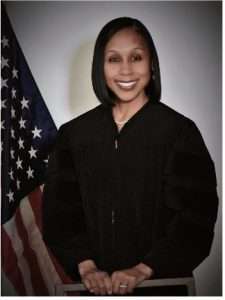 Nghana Lewis
Nghana Lewis
Judge, Louisiana 40th Judicial District Court
Laplace, Louisiana
Nghana Lewis was elected to serve as District Court Judge, Division B, 40th Judicial District Court, on November 4, 2020 and began serving on January 1, 2021. A proud native of Lafayette, Louisiana, Judge Lewis holds a BA in English from Tulane University; a PhD in English from the University of Illinois at Urbana-Champaign; and a JD from Loyola University College of Law. Prior to her election, Judge Lewis was a tenured associate professor, with joint appointments in the English Department and Africana Studies Program, at Tulane University. She was also an affiliate faculty member of Tulane’s School of Law and an adjunct professor with Tulane’s Department of Psychology. In addition to her positions at Tulane, Judge Lewis maintained a private law practice, serving clients in the areas of criminal defense, employment & labor, and civil rights. In 2021, Judge Lewis was appointed to Louisiana’s Children’s Justice Act Task Force and, in 2022, she was appointed to the Louisiana Supreme Court Technology Commission, one of only three standing committees of the Louisiana Supreme Court, for a two-year term. Currently, Judge Lewis serves as Parliamentarian for the Louisiana 4th and 5th Circuits Judges Association. She also continues to teach part-time at her beloved Tulane University. With funding appropriated by the Louisiana State Legislature and allocated to the 40th Judicial District Court, by the Louisiana Supreme Court in 2021, Judge Lewis launched The Literacy Clinic, in August 2021. The clinic supports literacy education for adults who are involved in the criminal justice system and families with children enrolled in resource-challenged public schools. The ultimate goal of the clinic is to strengthen communities through prevention-by-way-of-intervention transformative criminal justice, juvenile justice, and K12 education. Judge Lewis is the proud wife of Corey Hutchinson and the proud mother of two beautiful girls, Ciel Noir and Cydney Isabella.
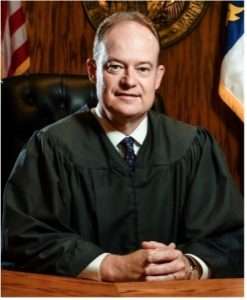 Martin McGee
Martin McGee
Judge, North Carolina Superior Court, 19A
Concord, North Carolina
Martin B. (Marty) McGee is the Senior Resident Superior Court Judge in Judicial District 19A (Cabarrus County, North Carolina) and serves as the chief administrator of justice in his community. He was elected in November 2014 to his current position. Earlier in 2014, Judge McGee was appointed by North Carolina’s Governor as one of North Carolina’s Special Superior Court Judges. In that position, he held court in twenty-four counties. Prior to serving on the Superior Court Bench, Judge McGee served as a District Court Judge in Judicial District 19A from October 2000 until January 2014. He was originally appointed to that position by North Carolina’s Governor and retained the position in three subsequent elections. As a District Court Judge, Judge McGee heard tens of thousands of cases involving family law, misdemeanor criminal cases, infractions, other civil cases, and pleas in lower-level felonies in some of North Carolina’s busiest courtrooms. He also served on the Education Committee for the Association of District Court Judges and regularly taught continuing judicial and legal education courses. As a Superior Court Judge, he has held court in more than 40 counties. He has presided over various types of civil matters including being appointed by the Chief Justice to three three-judge panels to address constitutional challenges to laws passed by the General Assembly. He has also presided over criminal cases ranging from traffic infractions to murder. Judge McGee believes that judicial officials should help educate the public about our courts. He has regularly written articles in newspapers and magazines about the law and our courts. He also hosted Court Q and A, a local television program about legal matters. Judge McGee has served or is serving on numerous statewide committees including the Chief Justice’s Remote Proceedings Task Force (co-chair), the Juvenile Jurisdiction Advisory Committee (Raise the Age Committee), and the NC Trial Courts Time Standards Committee. He also regularly teaches continuing legal education courses. Prior to his service as a judge, he practiced law in Cabarrus County. He represented people in courts ranging from Small Claims Court to the Supreme Court of the United States. He worked on four matters that were argued before the Supreme Court of the United States and sat second-chair in one of those cases. Judge McGee is a graduate of the University of North Carolina and Wake Forest University School of Law. He is married to Debin McGee, and they have two daughters, Dorothy (a UNC Law 2L) and Eleanor (a high school junior). They reside in Concord, North Carolina.
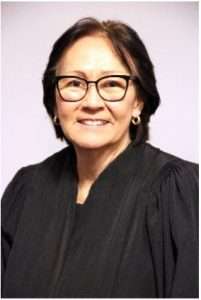 Sabrina McKenna
Sabrina McKenna
Associate Justice, Supreme Court of Hawai’i
Honolulu, Hawai’i
Sabrina Shizue McKenna has been an Associate Justice of the Hawaiʻi Supreme Court since 2011. She grew up in Japan attending US DOD schools and is a graduate of the University of Hawaiʻi at Manoa (“UHM”), which she attended on a basketball scholarship as an early beneficiary of Title IX. She received her J.D. in from UHM’s William S. Richardson School of Law (“WSRSL”), where she served as Editor-in-Chief of the Law Review. From 1982 to 1993, she was a civil litigator in Honolulu, general counsel to a Japan-based organization, an instructor in business law at the UHM, and an assistant professor at the WSRSL. In late 1993, she was appointed to Hawaii’s limited jurisdiction District Court. From her June 1995 appointment to the general jurisdiction Circuit Court to March 2011, she presided over civil, criminal, and family law matters and also served as presiding judge of the Family Court of the First Circuit (Oahu). Justice McKenna has led the Hawaiʻi Supreme Court’s Task Force on Attorney Well-Being, the Committee on Equality and Access to the Courts, and the Committee on Court Interpreters and Language Access, where she oversaw creation of the state’s court interpreter certification program. She is an ABA Fellow and is a Judicial Advisory Board member for the George Mason University Antonin Scalia Law School Law & Economics Center’s Judicial Education Program, a Board Member of the International Association of LGBTQ+ Judges, and an Honorary Adjunct Professor at Jindal Global Law School in Delhi, India. She speaks on various issues locally, nationally, and internationally. Her honors include the ABA’s Margaret Brent Women Lawyers of Achievement Award and Stonewall Award, the National Asian Pacific American Bar Association’s Daniel K. Inouye Trailblazer Award, the Hawaii Women Lawyers Outstanding Judicial Achievement Award, the University of Hawaii Distinguished Alumnus Award, and recognition as an Association of Corporate Counsel Foundation’s Global Women in Law & Leadership Honoree. She is a proud parent of three adult children and loves karaoke and watching sports.
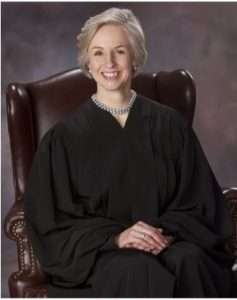 Kimberly Mueller
Kimberly Mueller
Chief Judge, U.S. District Court, Eastern District of California
Sacramento, California
Chief United States District Judge Kimberly J. Mueller was appointed by President Barack Obama as a United States District Judge for the Eastern District of California on December 21, 2010. She assumed the role of Chief Judge on January 1, 2020, based on seniority. She is the first woman to serve the Eastern District as a District Judge and as Chief Judge. Prior to her appointment, Judge Mueller was a Magistrate Judge from March 2003 to December 2010. Judge Mueller has served on the Ninth Circuit Court of Appeals Education Committee, and previously sat as a District Judge representative on the Circuit’s Conference Executive Committee. From 2015 to 2019, she was a member of the Federal Judicial Center Board. Formerly, as a Magistrate Judge, she was a member of the Ninth Circuit’s ADR Committee, played a lead role in establishing the Eastern District’s pro bono panel of attorneys available for appointment in pro se cases and spearheaded the process to secure the District’s first dedicated ADR and Pro Bono Director. Judge Mueller was a member of the ad hoc committee convened after 9/11 by District Judge Frank C. Damrell, Jr. (ret.) to launch his visionary civics education program known as Operation Protect & Defend, and she has remained active in OPD since. Until recently, she served as a member of the Power of Democracy Committee that advises the Chief Justice of California on civics education initiatives. She is a co-founder of The Justice Anthony M. Kennedy Library and Learning Center, located since March 2013 in the Ninth Circuit Library at Sacramento’s Robert T. Matsui U.S. Courthouse. Judge Mueller has taught as an adjunct professor at UC Davis School of Law and McGeorge Law School. Her classes have included an early survey course on cyberlaw, as well as copyright and federal courts. Prior to appointment as a judge, Judge Mueller was in private practice in Sacramento, specializing in intellectual property litigation. Before becoming a lawyer, she served on the Sacramento City Council from 1987 to 1992. Judge Mueller received her B.A. cum laude from Pomona College in 1981 and her juris doctorate from Stanford Law School in 1995. She maintains her chambers in the Robert T. Matsui U.S. Courthouse in Sacramento. In her spare time she sings second alto in a community chorus and practices agility with her Australian kelpie Micah.
 Michael Newman
Michael Newman
Judge, U.S. District Court, Southern District of Ohio
Dayton, Ohio
Hon. Michael J. Newman is a United States District Judge in the Southern District of Ohio’s Dayton seat of court. He was appointed in 2020. He previously served as a United States Magistrate Judge, a position to which he was appointed in 2011, and reappointed in 2019 to a second eight-year term. Judge Newman graduated with honors from the Washington College of Law at American University, and attended the Advanced Mediation Program at Harvard Law School. Prior to taking the bench, he was a partner at Dinsmore & Shohl in Cincinnati, where he chaired the firm’s Labor & Employment Appellate Practice Group. While in private practice, he was named a Leading Lawyer, an Ohio Super Lawyer, and one of the Best Lawyers in America in Labor & Employment Law. As a Magistrate Judge, he created and presided over the first Federal Veterans Treatment Court in Ohio. Judge Newman’s bar service is extensive; he was the first Magistrate Judge in the United States to be appointed National President of the Federal Bar Association. His Civics and Service to Others initiative as FBA president resulted in thousands of young people from all across the country meeting with federal judges to learn about civics and the Third Branch of government. This civics work continues; Judge Newman was named the FBA’s first Judicial Ambassador for Civics Education, and he has been invited to speak on the topic of civics education by the Federal Judicial Center. He now co-chairs the Sixth Circuit’s Civics and Outreach Committee, and chairs the Southern District of Ohio’s Civics Committee. Judge Newman has been recognized by the Federal Magistrate Judges Association for “valuable and dedicated service to all Magistrate Judges,” and was honored to receive the Boots Fisher National Public Service Award given annually to one lawyer in the United States for “exemplary community, public and charitable service.” In 2020, he was honored to receive the Ohio State Bar Foundation’s highest award, the Ritter Award, “for a lifetime of service…in attaining and promoting the highest standards of professionalism, integrity and ethics in the practice of law while assisting other attorneys, the courts and the public to envision and cause changes which improve the justice system in Ohio.” Judge Newman and his wife, Rachel, are the proud parents of triplet daughters who attend public school in the Dayton area.
 Arturo Prado Puga
Arturo Prado Puga
Judge, Supreme Court of Chile
Santiago, Chile
Joined the Supreme Court of Chile in 2012, performing first as an external counsel, after being proposed by the Court, the President of the Republic of Chile, and further ratified and appointed by 2/3 of the Senate in 2017, as a full member and judge of the Supreme Court following the whole Constitutional procedure for nomination. Earned a Jurist Doctor degree (1988) at the University of Navarre, in Pamplona, Spain, following postgraduate studies in Mediation, Litigation and Alternative Solutions to Litigation at Harvard University, Mass United States. Studied at the Faculty of Laws in the University of Chile, in which I currently teach as a Professor having earned full tenure in Commercial Law. Appointed Member of its Academic Evaluation and Review Council of the Faculty. Author and co-author of more than 40 publications, including books, collective works, monographs and articles in magazines and revues, on various matters related to law and professional skills for trial lawyers. Served as Director of the of the Bar Association Review of my country; General Counsel of the Bar Association; Director of the Chilean Institute of Commercial Law; In addition, I am currently serving as President of the “New Commercial Codification” Commission appointed by the University and the Justice Department. Married and father of five children.
 Jason Pulliam
Jason Pulliam
Judge, U.S. District Court, Western District of Texas
San Antonio, Texas
Jason Kenneth Pulliam was born in 1971 in Brooklyn. Pulliam earned a B.A. in political science, cum laude, from the City University of New York – Brooklyn College in 1995, an M.A. in political science from the City University of New York – Brooklyn College in 1997, and a J.D., cum laude, from the Thurgood Marshall School of Law at Texas Southern University in 2000. In law school, Pulliam served on the law review. After his graduation, Pulliam spent three years as a Judge Advocate in the United States Marine Corps. After leaving the Marines, Pulliam spent the next six years as an associate in private practice, moving between The Carlson Law Firm, Ball & Weed P.C. and Ford & Murray PLLC. In 2011, Pulliam became a Judge with the Bexar County Court of Law No. 5. In 2015, he was appointed by Gov. Rick Perry as a Justice on the Texas Fourth Court of Appeals. In 2016, Pulliam joined the law firm of Prichard & Young where he worked as he was considered for appointment to his current post as United States District Judge to the San Antonio Division in the Western District of Texas. On March 5, 2019, President Donald Trump nominated Pulliam for appointment as a U.S. District Judge. The U.S. Senate confirmed Pulliam on July 31, 2019, and he received his commission to the bench on August 5, 2019. Pulliam was the first African American Republican to be a Bexar County judge when he was appointed in 2011. He then became the first African American to sit on the Texas Fourth Court of Appeals and, now is the first African American to hold a bench on the U.S. District Court for the Western District of Texas.
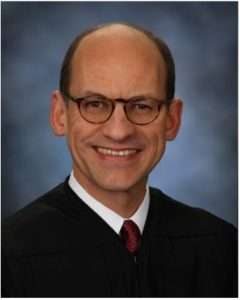 Robert Schroeder III
Robert Schroeder III
Judge, U.S. District Court, Eastern District of Texas
Texarkana, Texas
Robert W. (Trey) Schroeder III is a United States District Judge for the Eastern District of Texas, Texarkana Division. He was nominated by President Obama on June 26, 2014, confirmed by the Senate on December 16, 2014, and received his commission on December 19, 2014. Judge Schroeder was in private practice from 1999 to 2014, and he represented individuals and corporations in the federal and state courts of Texas and Arkansas in general civil and commercial litigation. He clerked for Judge Richard S. Arnold of the U.S. Court of Appeals for the Eighth Circuit, and he served in the White House as Associate Counsel to the President. He received his law degree from Washington College of Law at American University in 1994 and his undergraduate degree from the University of Arkansas at Little Rock in 1989.
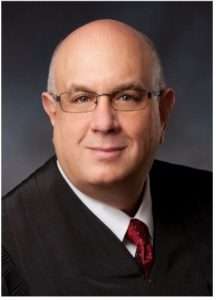 Michael Simon
Michael Simon
Judge, U.S. District Court, District of Oregon
Portland, Oregon
Michael H. Simon is a United States District Judge in the District of Oregon. He received his law degree cum laude from Harvard Law School in 1981 and his undergraduate degree summa cum laude and Phi Beta Kappa from the University of California at Los Angeles in 1978. After law school, Judge Simon was a trial attorney with the United States Department of Justice, Antitrust Division in Washington, D.C. until 1986, when he and his wife moved to Oregon. In 1986, Judge Simon joined a law firm in Portland where he had a trial and appellate practice in federal and state courts, handling a wide variety of business cases and several First Amendment matters until his confirmation as a federal judge in 2011. He is a Fellow of the American College of Trial Lawyers (since 2006), a Master in the Owen M. Panner chapter of the American Inns of Court, and a past Adjunct Professor of Law at Lewis and Clark Law School where he taught Antitrust Law. He also serves on the board of the Classroom Law Project, where he is a past president. Judge Simon has served on the Ninth Circuit Jury Instructions Committee since 2012 (which he chaired from 2017-2021) and on the Ninth Circuit Judicial Conference Executive Committee since 2016 (which he currently chairs). He also currently is chairing the Ninth Circuit Committee to revise the Jury Trial Manual. He presides over a full docket of civil and criminal cases and also handles multidistrict litigation.
